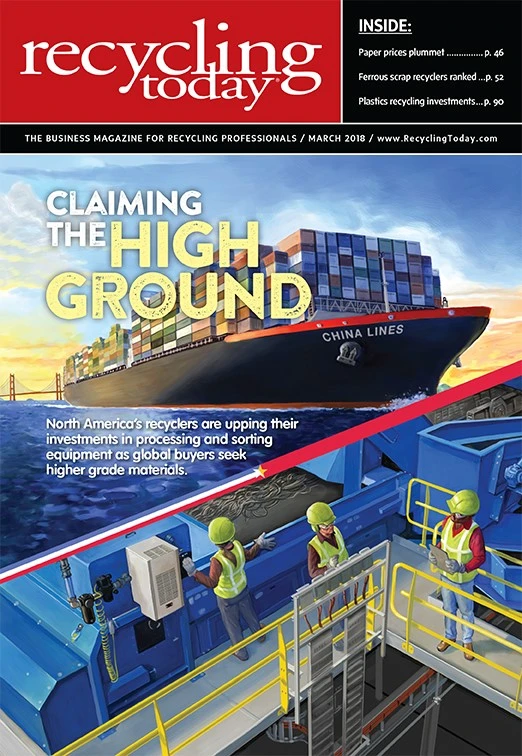Coca-Cola establishes ambitious recycling goals

The Coca-Cola Co. has announced a global goal of assisting in the recycling of 100 percent of its packaging by 2030. Coca-Cola says the goal, announced Jan. 19, 2018, is part of its new packaging vision for a “World Without Waste.”
The program includes a multiyear investment designed to make packaging 100 percent recyclable.
Atlanta-based Coca-Cola, along with its bottling partners, indicates it is pursuing several goals, including taking back one bottle for every bottle it sells by 2030. To accomplish this, the company says it is investing to support the collection of packaging, including bottles and cans from other companies, throughout the industry. To achieve its collection goal, Coca-Cola indicates it is working toward making all its packaging 100 percent recyclable. (Most of its packaging is already recyclable, according to the company.) By 2030, Coca-Cola says it also aims to package in bottles made with an average of 50 percent recycled content.
Coca-Cola says several partners will help the company achieve its goals, including the New Plastics Economy Initiative of the London-based Ellen MacArthur Foundation, the Ocean Conservancy/Trash Free Seas Alliance and the World Wildlife Fund’s Cascading Materials Vision and Bioplastic Feedstock Alliance.
The beverage company also says it will launch efforts with new partners at the regional and local level and will work with its customers “to help motivate consumers to recycle more packaging.”
City of Montgomery, Alabama, purchases IREP recycling facility

The Infinitus Renewable Energy Park (IREP) recycling facility in Montgomery, Alabama, has been purchased by that city, according to a report by the Montgomery Advertiser. The material recovery facility (MRF), which recovered recyclables from municipal solid waste (MSW), was built for $35 million and claimed to be able to recover nearly 60 percent of the material delivered to its door for recycling. With the addition of waste to energy and composting, IREP said it would see a landfill diversion rate topping 90 percent.
According to the Montgomery Advertiser report, the city finalized the deal Dec. 29, 2017, paying $625,000 for the facility and $320,000 in other fees and taxes.
The city and its Solid Waste Disposal Authority signed an agreement in July 2016 to acquire the MRF and an adjacent lot from IREP once bankruptcy proceedings were completed. The city finally closed on that bankruptcy agreement in December 2017 after it had been locked in bankruptcy court since August 2016 because holders of bonds issued by IREP in 2014 opposed the sale, saying they had a better claim to the facility than the city did, the newspaper reports. To finalize the deal, the city paid the agreed upon sale price of $625,000, $125,000 in other fees (including IREP’s legal fees) and $195,000 in property taxes IREP owed and accrued after the facility closed in October 2015, Barry Crabb, Montgomery’s finance director, told the Montgomery Advertiser.
The city reached a settlement with the 2014 bondholders to complete the sale.
After opening in April 2014, IREP closed in October 2015, citing commodity pricing that was unable to support the recycling process.
When the MRF was built, the city was obligated to deliver 100,000 tons of MSW annually, paying a tipping fee for the material. Whatever material was not recovered for recycling, composting or energy recovery at IREP was to be delivered to the city’s landfill, with IREP paying the city a tipping fee.
FCC to build MRF in Houston

The Houston City Council has awarded FCC Environmental Services, The Woodlands, Texas-based American environmental services subsidiary of the Spanish company FCC Group, the contract to design, finance, build and operate a material recovery facility (MRF) that will sort and market the city’s recyclables for 15 years, extendable up to 20 years. The expected contract value is more than $250 million, including the sale of recovered materials from Houston and from third parties, though the cost for the city will not exceed $36.8 million, FCC says.
The company calls Houston a “strategic enclave,” noting that the city, with its population of some 2.3 million, is the fourth most populated city in the U.S. and will soon be the third, according to growth predictions.
Before the addition of the Houston contract, FCC says its U.S. contracts value $900 million and that it serves more than 8 million Americans.
The company says it has more than 50 facilities that are similar to the one it proposed for Houston, including one near Dallas. The Houston MRF will sit on nearly 15 acres with a footprint in excess of 118,000 square feet.
FCC says it plans to process 120,000 metric tons per year at the Houston MRF with a maximum capacity of 145,000 metric tons. The MRF will be equipped with the latest materials separation technologies, according to the company.

Explore the March 2018 Issue
Check out more from this issue and find your next story to read.
Latest from Recycling Today
- Lautenbach Recycling names business development manager
- Sebright Products partners with German waste management equipment company
- WasteExpo transitions to biennial format for enhanced experiences
- Study highlights progress, challenges in meeting PCR goals for packaging
- Washington legislature passes EPR bill
- PureCycle makes progress on use of PureFive resin in film trials
- New copper alloy achieves unprecedented high-temperature performance
- Gränges boosts profits and sales volume in Q1 2025





